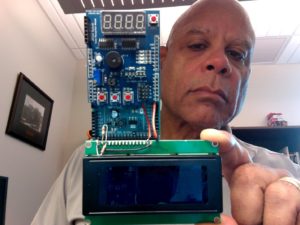At a young age, Mark Dean showed a lot of promise, having been born to James and Barbara Dean in 1957, at a time when racial segregation was rife. You can imagine what it was like to be an African American child at the time. As much as the black community was fast rising, the divide between the races was apparent. This is not a story about giving in to fate, but rather, one that goes into the beauty of breaking barriers.

Source: https://pbs.twimg.com/media/Dyfllh3WsAAhKuE.jpg
Homelife
Mark grew up in Jefferson City, Tennessee. Surrounded by the beautiful Smoky Mountains, he made his way through life with the support of his parents and the community around him. His father was a dam supervisor at the Tennessee Dam Authority. During his rounds, he would allow young Mark to follow him, exposing him to the beauty of engineering and mechanics. It was not long before Mark’s fascination with the dams peaked his interest in science. Mark’s father was not the only motivator in his quest for education. His grandfather worked as a high school principal. He thus could see what a bright future he could have if only he put his mind to it. Even now, Mark has reiterated that the role of his family in his life enabled him to keep going even when times got tough.

Source: https://www.sunsigns.org/famousbirthdays/d/images/pics/mark-dean-0.jpg
School Years
Again, Mark grew up at a time when racial segregation was the norm. It was thus not surprising that even if the school had a few African-American students, they were kept in a classroom by themselves. While this might have dampened the spirits of another person, Mark did not let it get to him. In fact, he says that the strategic position enabled him to catch up on the 4th-grade math lessons. He could clearly hear the teachers imparting education to children who were three grades higher than him and he thoroughly enjoyed this opportunity. This enjoyment was not to last as schools finally put an end to segregation, and Mark had to make do with his grade lessons.
At home, Mark was equally thriving and had proved to his family his interest in building things from scratch. He and his father even worked on building a tractor. He looks back at his past and says that his father and grandfather were clear about how to go about life. They showed him that there were many paths to choose, all of which were right. But instead of following all the paths, he had to choose one and stick to it. If it did not work, he could go back and choose another path and see what happened. The goal was not to quit.
And so it was that he continued with his education and made it to high school where he engaged in studies and athletics with zeal. His efforts did not go unnoticed and he was soon receiving offers from varsities, finally choosing to study at the University of Tennessee, where he pursued electrical engineering. In 1979, at the age of 22, he graduated and joined the IBM facility in Boca Raton in Florida.

Source: https://www.captechu.edu/sites/default/files/BLOG_Mark%20Dean.jpg
Career
For him, this opportunity was a dream come true, as he had always hoped to have a chance to work here. He did not let it go to waste and pursued his master’s in electrical engineering from the Florida Atlantic University for the next three years. With his degrees as well as what he was learning at IBM, you had a lot to offer to the company. Mark was very proactive at work and he rose through the ranks very fast, earning the respect of his seniors as well as his peers. It was this tenacity that saw him work with Dennis Moeller to create the industry-standard architecture (ISA) systems bus. This technology made it possible to connect peripheral devices directly to computers, making it easier to integrate components. As he was inventing, he did not stop studying, and by 1992, he received his Ph.D. in electrical engineering from Stanford University. It was this continuous education that made him such an asset to the company and enabled him to tackle current issues. Computer science was developing at a fast rate, and Mark was able to keep up with it, by focusing on his education and being an integral part of the IBM Development Team.

Source: http://web.eecs.utk.edu/~markdean/HITES11ProjectKit.jpg
He started focusing on improving the personal computer by developing a color monitor for PCs. It helps to note that when IBM first released their personal computer in 1981, there were nine patents for the technology, three of which belonged to Mark. Four years after getting his doctorate, Mark got the honor of being made an IBM fellow, which is the highest possible rank of excellence at the company. Up till that time, no other African American had ever received this honor. His awards did not stop, and in 1997, he was not only inducted into the National Inventors’ Hall of Fame but also awarded the Black Engineer of the Year President’s award.
As a man who did not believe in quitting, Mark continued to innovate, and with other engineers, he developed the first one gigahertz computer processor chip in 1999. This little piece of technology allowed computers to carry out billions of calculations per second. It was this invention that enabled computer science to take yet another giant leap into the future.
To date, Mark has 20 patents in his name and works as the interim Dean at the Tickle College of Engineering at the University of Tennessee. He truly is a force to reckon.
